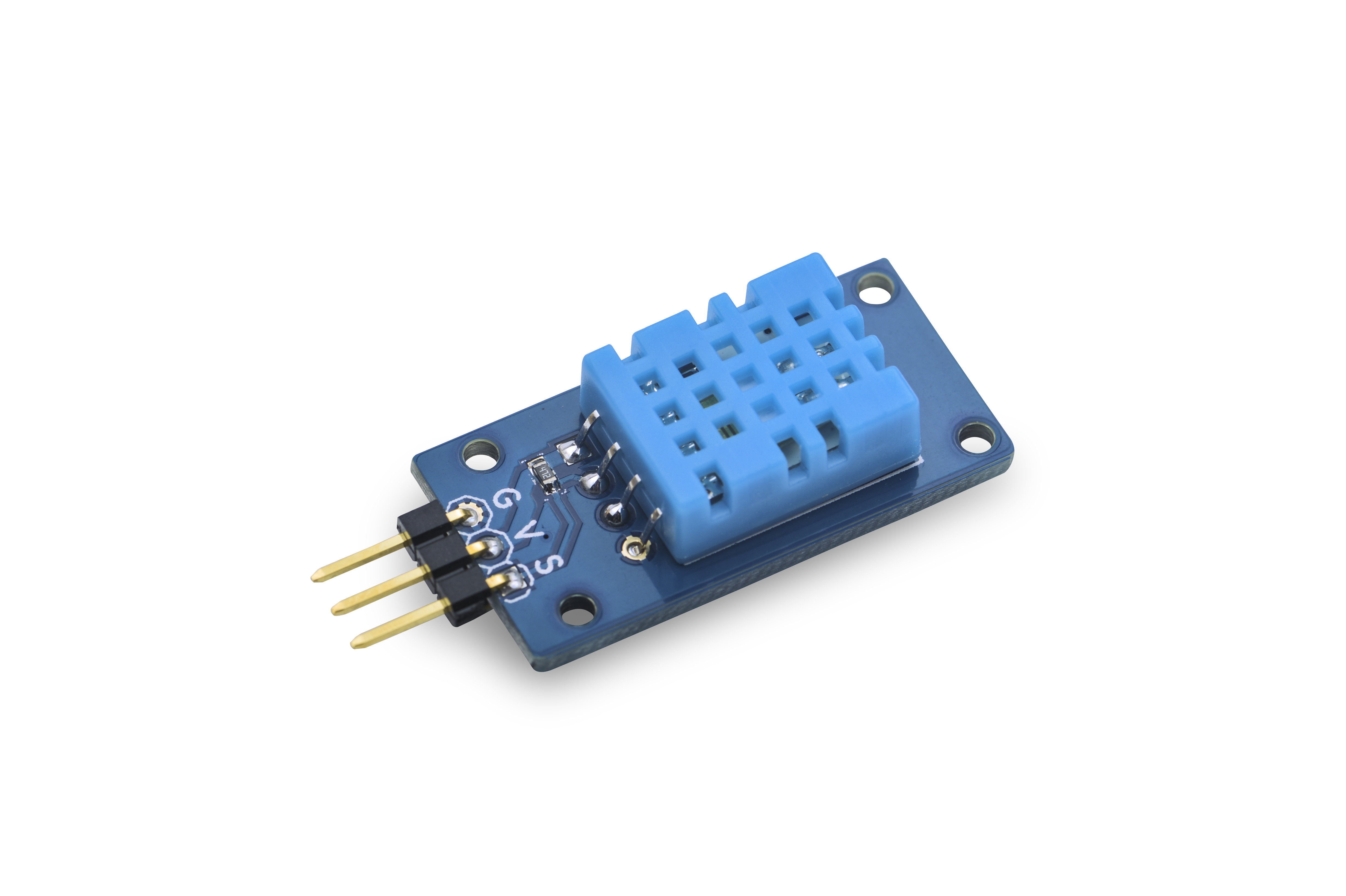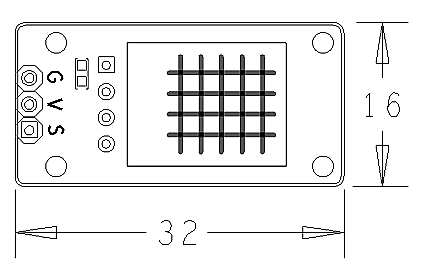Difference between revisions of "Matrix - Temperature and Humidity Sensor"
(→Feb-23-2016) |
|||
| (3 intermediate revisions by the same user not shown) | |||
| Line 36: | Line 36: | ||
| − | == | + | ==Applications== |
| − | === | + | ===Connect to NanoPi M1=== |
| − | + | Refer to the following connection diagram to connect the module to the NanoPi M1:<br> | |
[[File:Matrix-Temperature_and_Humidity_Sensor_nanopi_m1.jpg|frameless|600px|Matrix-Temperature_and_Humidity_Sensor_nanopi_m1]] | [[File:Matrix-Temperature_and_Humidity_Sensor_nanopi_m1.jpg|frameless|600px|Matrix-Temperature_and_Humidity_Sensor_nanopi_m1]] | ||
| − | + | Connection Details: | |
{| class="wikitable" | {| class="wikitable" | ||
|- | |- | ||
| Line 53: | Line 53: | ||
|} | |} | ||
| − | === | + | ===Connect to NanoPi 2=== |
| − | + | Refer to the following connection diagram to connect the module to the NanoPi 2:<br> | |
[[File:Matrix-Temperature_and_Humidity_Sensor_nanopi_2.jpg|frameless|600px|Matrix-Temperature_and_Humidity_Sensor_nanopi_2]] | [[File:Matrix-Temperature_and_Humidity_Sensor_nanopi_2.jpg|frameless|600px|Matrix-Temperature_and_Humidity_Sensor_nanopi_2]] | ||
| − | + | Connection Details: | |
{| class="wikitable" | {| class="wikitable" | ||
|- | |- | ||
| Line 69: | Line 69: | ||
|} | |} | ||
| − | === | + | ===Connect to NanoPi M2 / NanoPi 2 Fire=== |
| − | NanoPi | + | Refer to the following connection diagram to connect the module to the NanoPi M2/ NanoPi 2 Fire:<br> |
| − | + | ||
[[File:Matrix-Temperature_and_Humidity_Sensor_nanopi_m2.jpg|frameless|600px|Matrix-Temperature_and_Humidity_Sensor_nanopi_m2]] | [[File:Matrix-Temperature_and_Humidity_Sensor_nanopi_m2.jpg|frameless|600px|Matrix-Temperature_and_Humidity_Sensor_nanopi_m2]] | ||
| − | + | Connection Details: | |
{| class="wikitable" | {| class="wikitable" | ||
|- | |- | ||
| Line 86: | Line 85: | ||
|} | |} | ||
| − | === | + | ===Connect to NanoPC-T2=== |
| − | + | Refer to the following connection diagram to connect the module to the NanoPC-T2:<br> | |
[[File:Matrix-Temperature_and_Humidity_Sensor_NanoPC-T2.jpg|frameless|600px|Matrix-Temperature_and_Humidity_Sensor_NanoPC-T2]] | [[File:Matrix-Temperature_and_Humidity_Sensor_NanoPC-T2.jpg|frameless|600px|Matrix-Temperature_and_Humidity_Sensor_NanoPC-T2]] | ||
| − | + | Connection Details: | |
{| class="wikitable" | {| class="wikitable" | ||
|- | |- | ||
| Line 102: | Line 101: | ||
|} | |} | ||
| − | == | + | ==Compile & Run Test Program== |
| − | + | Boot your ARM board with Debian and copy the matrix code: | |
<syntaxhighlight lang="bash"> | <syntaxhighlight lang="bash"> | ||
$ apt-get update && apt-get install git | $ apt-get update && apt-get install git | ||
$ git clone https://github.com/friendlyarm/matrix.git | $ git clone https://github.com/friendlyarm/matrix.git | ||
</syntaxhighlight> | </syntaxhighlight> | ||
| − | + | If your cloning is done successfully a "matrix" directory will be generated. | |
| − | + | Compile and install Matrix: | |
<syntaxhighlight lang="bash"> | <syntaxhighlight lang="bash"> | ||
$ cd matrix | $ cd matrix | ||
| Line 116: | Line 115: | ||
</syntaxhighlight> | </syntaxhighlight> | ||
| − | + | Run test program: | |
<syntaxhighlight lang="bash"> | <syntaxhighlight lang="bash"> | ||
$ matrix-temp_humidity | $ matrix-temp_humidity | ||
</syntaxhighlight> | </syntaxhighlight> | ||
| − | + | Note: this module is not plug and play therefore before running the module please make sure it is connected to an ARM board.<br> | |
| − | + | Here is what you should observe:<br> | |
<syntaxhighlight lang="bash"> | <syntaxhighlight lang="bash"> | ||
The humidity is 35000 | The humidity is 35000 | ||
The temperature is 26000 | The temperature is 26000 | ||
</syntaxhighlight> | </syntaxhighlight> | ||
| − | + | The module successfully read the environment's humidity and temperature values. | |
| − | == | + | ==Code Sample== |
| − | + | This Matrix code sample can work with all the ARM boards mentioned in this module's wiki. The name of this code sample is "matrix-temperature_and_humidity_sensor". Here is its source code: | |
<syntaxhighlight lang="c"> | <syntaxhighlight lang="c"> | ||
int main(int argc, char ** argv) | int main(int argc, char ** argv) | ||
| Line 161: | Line 160: | ||
} | } | ||
</syntaxhighlight> | </syntaxhighlight> | ||
| − | + | For more details about this APIs called in this code sample refer to [[Matrix API reference manual]] <br> | |
<!--- | <!--- | ||
| Line 451: | Line 450: | ||
==Connect to Arduino== | ==Connect to Arduino== | ||
---> | ---> | ||
| + | |||
==Resources== | ==Resources== | ||
[http://akizukidenshi.com/download/ds/aosong/DHT11.pdf DHT11.pdf] | [http://akizukidenshi.com/download/ds/aosong/DHT11.pdf DHT11.pdf] | ||
| Line 458: | Line 458: | ||
* Added the description for "NanoPi 2 branch" in Section 4 | * Added the description for "NanoPi 2 branch" in Section 4 | ||
* Added Section 5: Connect to NanoPi 2 | * Added Section 5: Connect to NanoPi 2 | ||
| − | + | ===June-24-2016=== | |
| + | * Re-organized and simplified wiki | ||
Latest revision as of 15:50, 24 June 2016
Contents
1 Introduction
- The Matrix-Temperature_and_Humidity_Sensor module is used to detect temperature and humidity.
- It utilizes the DHT11 temperature and humidity sensor. Its humidity range is 20% - 80% and the accuracy is 5%. Its temperature range is 0℃ - 50℃ and the accuracy is ±2℃.
2 Features
- Humidity range: 20 - 80%RH, Temperature range 0 ~ 50℃
- Accuracy of humidity: +-5%RH, accuracy of temperature: +-2℃
- One wire communication
- 2.54 mm spacing pin
- PCB dimension (mm): 16 x 32
Pin Description:
| Pin | Description |
| S | GPIO |
| V | Supply Voltage 5V |
| G | Ground |
3 Basic Device Operation
The DHT11 module uses a simplified single-bus serial communication. DATA controls communication and synchronization between the microprocessor and DHT11. A data transfer takes 4ms. The data format contains an integer part and a decimal part. The basic operation is as follows:
- a transmission of 40 data, the high first-out
- data format: 8bit humidity integer data + 8bit the Humidity decimal data
- 8bit temperature integer data + 8bit fractional temperature data
- 8 bit parity bit
- If a transmission is successful the “8bit humidity integer data + 8bit humidity decimal data +8 bit temperature integer data + 8bit temperature fractional data” 8bit checksum is equal to the results of the last eight.
- After the user host (MCU) sends a signal DHT11 is converted from low-power mode to high-speed mode, until the host begins to signal the end. Then DHT11 sends a response signal to send 40bit data, and trigger a letter collection. If DHT11 doesn't receive a signal from the host it will not begin a letter collection. After the letter collection is done DHT11 will turn to low power mode.
4 Applications
4.1 Connect to NanoPi M1
Refer to the following connection diagram to connect the module to the NanoPi M1:
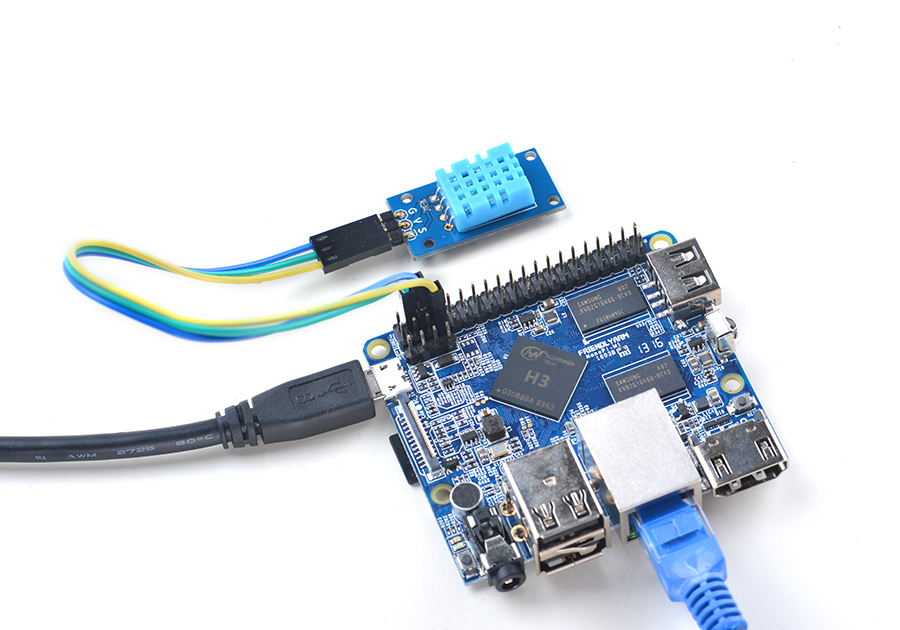
Connection Details:
| Matrix-Temperature_and_Humidity_Sensor | NanoPi M1 |
| S | Pin7 |
| V | Pin4 |
| G | Pin6 |
4.2 Connect to NanoPi 2
Refer to the following connection diagram to connect the module to the NanoPi 2:
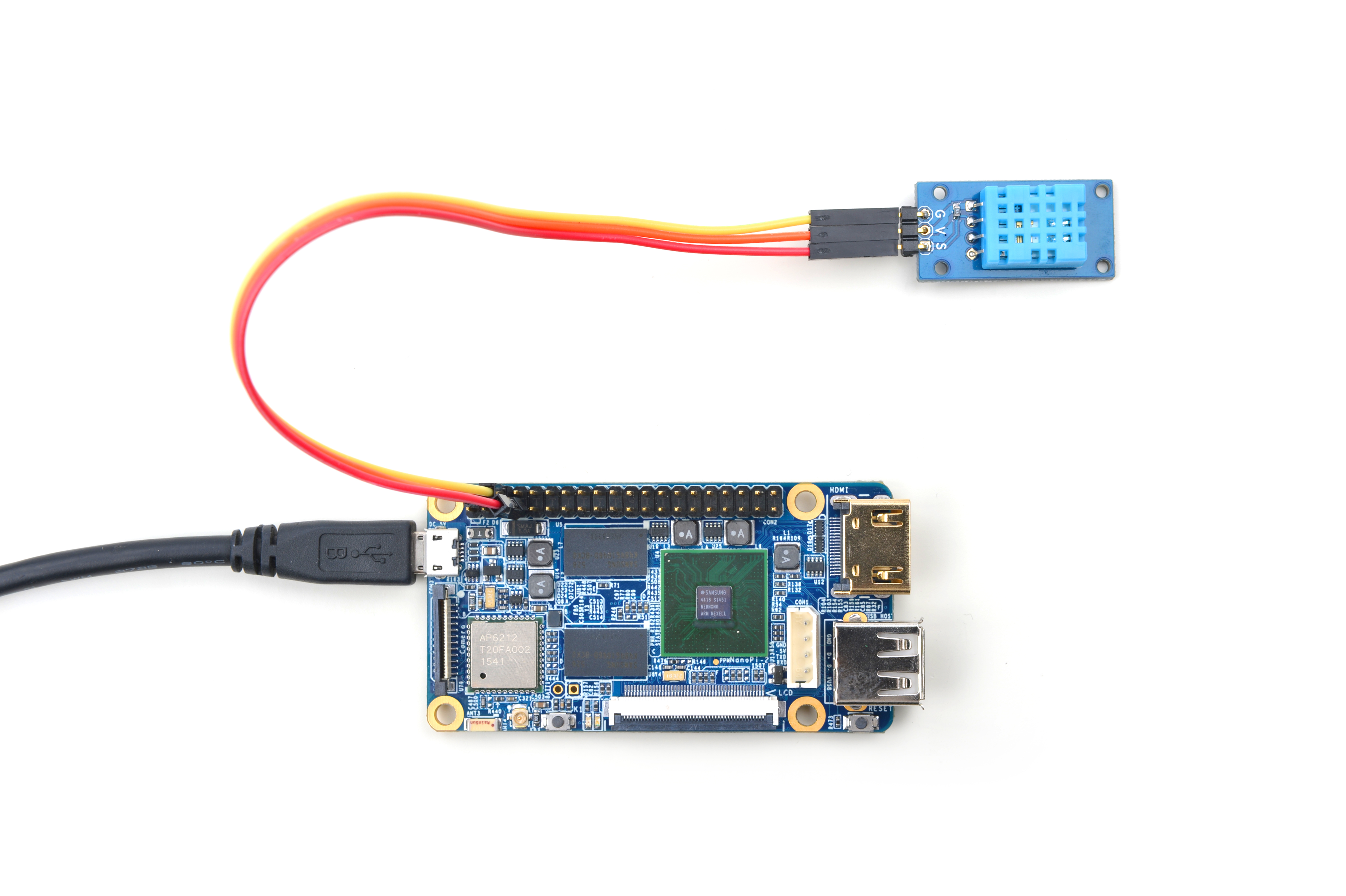
Connection Details:
| Matrix-Temperature_and_Humidity_Sensor | NanoPi 2 |
| S | Pin7 |
| V | Pin4 |
| G | Pin6 |
4.3 Connect to NanoPi M2 / NanoPi 2 Fire
Refer to the following connection diagram to connect the module to the NanoPi M2/ NanoPi 2 Fire:
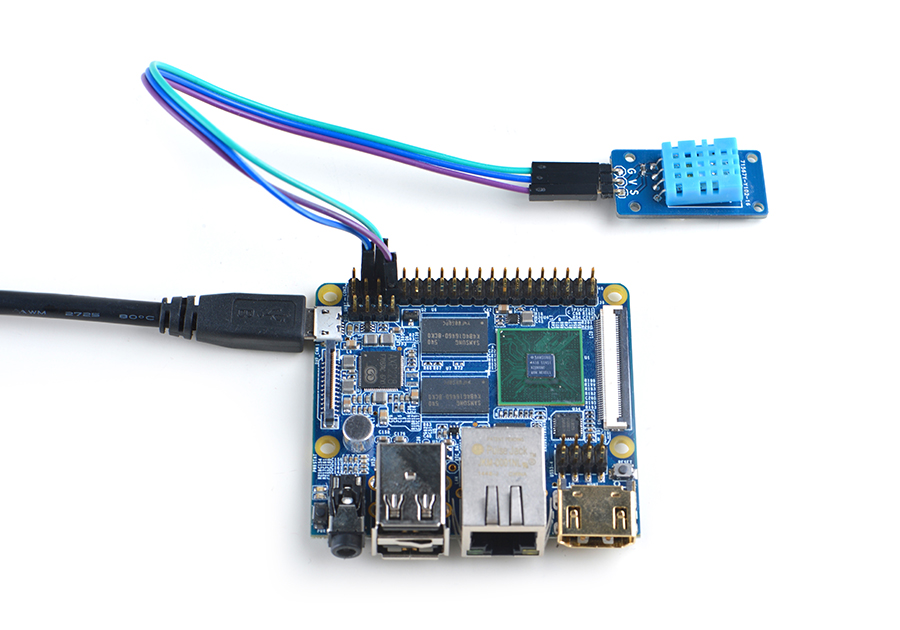
Connection Details:
| Matrix-Temperature_and_Humidity_Sensor | NanoPi M2 |
| S | Pin7 |
| V | Pin4 |
| G | Pin6 |
4.4 Connect to NanoPC-T2
Refer to the following connection diagram to connect the module to the NanoPC-T2:
Matrix-Temperature_and_Humidity_Sensor_NanoPC-T2
Connection Details:
| Matrix-Temperature_and_Humidity_Sensor | NanoPC-T2 |
| S | Pin15 |
| V | Pin29 |
| G | Pin30 |
5 Compile & Run Test Program
Boot your ARM board with Debian and copy the matrix code:
$ apt-get update && apt-get install git $ git clone https://github.com/friendlyarm/matrix.git
If your cloning is done successfully a "matrix" directory will be generated.
Compile and install Matrix:
$ cd matrix $ make && make install
Run test program:
$ matrix-temp_humidityNote: this module is not plug and play therefore before running the module please make sure it is connected to an ARM board.
Here is what you should observe:
The humidity is 35000 The temperature is 26000
The module successfully read the environment's humidity and temperature values.
6 Code Sample
This Matrix code sample can work with all the ARM boards mentioned in this module's wiki. The name of this code sample is "matrix-temperature_and_humidity_sensor". Here is its source code:
int main(int argc, char ** argv) { int ret = -1; int dhtTemp=0, dhtHdty=0, board; char modStr[BUF_SIZE]; int pin = GPIO_PIN(7); if ((board = boardInit()) < 0) { printf("Fail to init board\n"); return -1; } if (board == BOARD_NANOPI_T2) pin = GPIO_PIN(15); sprintf(modStr, "modprobe %s gpio=%d", DRIVER_MODULE, pintoGPIO(pin)); system(modStr); if ((ret = dht11Read(DHT_HUMIDITY, &dhtHdty)) != -1) { printf("The humidity is %d\n", dhtHdty); } else { printf("Faided to get humidity\n"); } if ((ret = dht11Read(DHT_TEMP, &dhtTemp)) != -1) { printf("The temperature is %d\n", dhtTemp); } else { printf("Faided to get temperature\n"); } system("rmmod "DRIVER_MODULE); return ret; }
For more details about this APIs called in this code sample refer to Matrix API reference manual
7 Resources
8 Update Log
8.1 Feb-23-2016
- Added the description for "NanoPi 2 branch" in Section 4
- Added Section 5: Connect to NanoPi 2
8.2 June-24-2016
- Re-organized and simplified wiki
